- Home
- Charles de Lint
Forests of the Heart Page 5
Forests of the Heart Read online
Page 5
“It scares me,” she said. “We’ve already had four homeless people die of exposure this year.”
“That you know of.”
She gave him a sharp look, then sighed. “That we know of,” she agreed.
There were places in the city where a body could easily remain undiscovered until the spring thaw. There’d been one last year in the Tombs, half-eaten by rats and wild dogs by the time someone stumbled over it. Her stomach went all queasy again, just thinking about it.
“Do you have any more of that coffee?” the man asked.
“Sure.”
She tried to place his accent as she led the way back to the van, but couldn’t. His voice had a husky quality—like someone unused to speaking, or uncomfortable with the language. She also got the impression that he was well-educated, though she couldn’t have said why. But it would have been some time ago, she decided, when the overcoat was still new.
After drawing him a coffee from the urn, she started to fill a second cup for herself, then quickly changed her mind. She didn’t much care for black coffee, but the thought of adding milk to it made her feel nauseous again.
“Here,” the man said. “Have a nip of this.”
He took a silver flask from the inside pocket of his jacket and held it out to her. Just what she needed with the way she was feeling—a shot of cheap whiskey. But the peppermint she’d been sucking on earlier had lost its effect and anything would be better than this sour taste in her mouth and throat.
“Thanks.”
She took a sip, bracing herself, but the liquid went down smooth as silk, with the full body of a fine brandy. Not until it had settled in her stomach did she realize the kick it had. She gasped and her eyes began to tear. But a fluttering warmth spread through her and the sour taste was finally gone. The liqueur held a faint bouquet of honey and herbs, of a field of wildflowers. It was like drinking a piece of summer and for a moment she almost thought she could hear the buzz of bees, feel the heat of a hot summer’s day.
“Wow,” she said and peered into the mouth of the flask. She caught a glimpse of a light, yellowish-amber liquid. “What is this stuff?”
“Metheglin,” the man told her. “A kind of Welsh whiskey made from hops and honey. Have some more,” he added when she started to hand the flask back.
Ellie did, this time rolling the liquid around in her mouth before finally swallowing it. She looked down at the flask, noting the fine filigree worked into the metal before her eyes teared up again. She drew in a sharp breath, savoring the bite of the cold as it hit the roof of her mouth.
“So where would you find it in a liquor store?” she asked. “Under whiskeys or … you said it was made from hops. That’s like beer, right?”
Except she’d never tasted either a whiskey or a beer that was this good.
The man shook his head. “Can’t be bought, I’m afraid. A friend of mine makes it and gives me the odd bottle.”
“Nice friend to have.”
“All friends are good to have.”
“Well, sure … I just meant…”
“I understand,” he said as her voice trailed off. “Sometimes I am too literal for my own good.”
Ellie handed him the flask and watched it vanish back under his coat. He took a sip of his coffee and smiled at her over the top of the brim. Amiable and not in the least threatening, but there was something odd about him all the same, something she couldn’t quite put her finger on.
What was his story? She didn’t think he was a street person, but he didn’t really fit in this neighborhood either. It was something in how he stood, in the cut of his clothes—neither belonged in the cheap apartments to be found around here. His coat was obviously tailor-made—old and worn, it was true, but it hadn’t come off a rack. It fit him too well. And that flask was quality silverwork, an antique, probably, and worth a small fortune. It wasn’t something a street person would be carrying around.
But then you met all kinds on the street and who was to say what kind of bad luck had come his way? She’d served coffee to men who had been worth millions as well as to those who’d never had more than a few dollars to their name in their whole lives. Some were still proud; some pretended they’d chosen this life. Some had given up all pretense, or simply didn’t care anymore. Which was he?
She was about to break one of Angel’s cardinal rules and ask what had happened to put him on the street when Tommy joined them.
“The police want to ask you a couple of things,” he said.
She gave him a questioning look.
“Nothing serious,” he told her. “They just need a few more details to finish their report—if you’re up for it.”
“Sure.”
She tossed a wave to the man and he gave her a grave nod in return. That was another thing, she thought as she walked away. He didn’t act like a street person either. He didn’t act like he even belonged in this century, though where that idea had come from, she couldn’t say. But she’d met people like that before, men and women who seemed displaced in time. Or not to belong to any time. She remembered a boy in art school who’d been completely oblivious to the twentieth century. Walked everywhere, didn’t watch TV, didn’t even have a radio. He’d been amazed by the very idea of acrylic paints. And photocopying. And computers.
Only that wasn’t really it either. Something about the man with the silver flask simply niggled at the back of her mind, the way a familiar face or forgotten name will. Not that she’d ever seen him before. It was just… something.
When she returned from the police cruiser, the stranger had left and there was only Tommy, sitting inside the van, waiting for her. She got in on the passenger’s side and put her gloved hands up to the heat vent. Right now the vaguely warm air felt as strong as the heat put out by a woodstove. Somehow she’d forgotten all about the cold—at least she had until she’d walked from the police cruiser back to the van and the harsh winds made a point of reminding her with a fierceness that almost blew her off her feet again.
“Who was your friend?” Tommy asked.
Ellie shrugged. “He didn’t say.”
Tommy gave her an odd look, then shrugged.
“I haven’t seen him around before,” he said.
“Me, either. I’m not even all that sure he’s a street person.”
Tommy smiled. “Not everybody out at this time of night is.”
“I know. It’s just… he was strange.”
Tommy raised his eyebrows.
“Have you ever heard of metheglin?” Ellie asked.
“Nope. What is it—some new kind of drug?”
Ellie shook her head. “No, it’s more like a liqueur. He said it was Welsh, that it was made from honey and …”
Her voice trailed off as her gaze alit on a small business card lying on the dashboard in front of her. She took off a glove and picked it up. The card read:
“Where did this come from?” she asked, passing it over.
Tommy shook his head. “I’ve no idea.”
“That man—was he in the van?”
“Not while I was here.”
Tommy turned the card over in his hand. There was nothing on the reverse.
“Handfast Road,” he said. “That’s in the Beaches, isn’t it? Up on the hill?”
“I think so.”
“Where all the fat cats live.”
Ellie nodded and took the card back. She pointed at the words “Musgrave Wood.”
“So is that a person or a place?” she asked.
“I’d say person.”
“But what kind of a given name is Musgrave?”
“Good point,” Tommy said. “Maybe it’s a business. Though I’ve got an aunt named Juniper Creek.”
“Really?”
“Would I lie to you?”
“Yes.”
Tommy’s family seemed to include a veritable mob of aunts. They all had unusual names, dispensed folk wisdoms at the drop of a hat, and Ellie had never met a single on
e of them. Sometimes she suspected Tommy hadn’t either. She looked at the card again.
“What’s that little design?” she asked. “It seems familiar.”
Tommy leaned over to have another look, then shrugged. “I don’t know. Judging from the ribbonwork, I’d say it’s something Celtic. I think I saw something like it on one of those Celtic harp albums Megan’s playing all the time.”
“You’re right. And it’s on more than one. I wonder if it means something.”
“Sure it does. It’s a secret code for ‘Here there be Celtic harp music.’ “
Ellie laughed. “Of course. What else?”
Then something else occurred to her.
“There’s no phone number,” she said. “Isn’t that weird?”
Tommy smiled. “Anything is weird if you think about it long enough. Like why are our noses designed so that they’ll drip right into our mouths?”
“Thank you for sharing that.”
She flicked the edge of the card with a fingernail. The man she’d been talking to couldn’t have put it on the dash, not with the doors and windows of the van closed the way they’d been. All the same, she was sure the card had come from him. He had to have opened the door and dropped it on the dash when Tommy was with the police and she was bringing coffee to the two homeless men. But that still didn’t explain why he’d left it. Or what they were supposed to do with it.
She started to toss the card back where she’d found it, then stuck it in her pocket instead.
“Well,” she said. She leaned back into her seat and buckled up her seat-belt. “It’s still cold as hell out there and people need our help. The mystery of this card’s just going to have to wait.”
Tommy nodded. He put the van in gear, checked for traffic, then pulled away from the curb.
“Little mysteries,” he said. “They’re good for the soul.”
“How so?”
“They keep us guessing.”
“And that’s a good thing?”
“Well, sure. Mysteries break the patterns we impose upon the world—or maybe let us see them more clearly for a change.”
“One of your aunts tell you that?”
“I think it was Aunt Serendipity.”
“Of course.”
Ellie wasn’t particularly fond of mysteries or puzzles herself. She always liked to know where she stood, how things fit. The fact that the universe wasn’t always so obliging never stopped her from trying to keep everything in its place, lined up, just the way it was supposed to be.
“And speaking of mysteries,” Tommy went on, “here’s another one for you.”
She turned to look at him.
“What’s a quick way to tell if you’re dealing with a transvestite or a real woman?”
Ellie shook her head. “I give up,” she said, and waited for the punchline.
“You check for an Adam’s apple,” Tommy said.
“I don’t get the joke.”
“It’s not a joke,” Tommy told her. “That guy you were talking to …”
The niggling feeling she’d had earlier returned, then vanished with a snap of understanding.
“He didn’t have one,” she said.
Tommy nodded. “In fact, he’s a rather mannish she. I was surprised that you hadn’t noticed.”
“So why do you think she’s walking around at this time of night, pretending to be a man?”
Tommy shrugged. “Why not?”
Ellie nodded slowly. Sure. Why not, indeed? On a one-to-ten scale of strangeness, it barely registered as a one. What a city this was.
2
WEDNESDAY MORNING, JANUARY 14
Hunter Cole stood at the cash in Gypsy Records. Leaning on the counter amid a clutter of invoices and record company catalogs, he stared out the big front window, only half-listening to the music playing on the store’s sound system: a solo album by Karan Casey, the singer from Solas. He should have been enjoying the CD, but it could barely keep his attention today, little say engage it.
He couldn’t fault the music; the trouble lay with him and nothing seemed to help. Not the music. And certainly not the weather.
Early this morning the latest cold snap had broken, but now it was snowing again. Big lazy flakes drifted by the display window, blurring the view he had of Williamson Street. For the way he was feeling, it should have been raining. A steady, depressing downpour—the kind of relentless precipitation that eventually overwhelmed even the most cheerful soul with its sheer volume and persistence. The snow was too postcard-pretty. It hid the ugliness, rounding off all the sharp edges until even a heartless behemoth like this city could seem to hold something good in it. But the softness, the prettiness … it was all a lie. Maybe you couldn’t see them, but the sharp edges remained under the snow nevertheless, waiting to catch you unawares and cut you where it hurt.
Ria had still moved out. Four weeks and counting. He had a Christmas present for her, wrapped up and sitting on a shelf in his office at the back of the store, that he doubted he’d ever give to her now.
He was still in a rut—the same one he’d been in before he’d even thought of buying the store a few years ago—only now it ran deeper.
Buying the store. That had been a mistake.
Gypsy Records got its name from John Butler, a short barrel of a man without even a pretense of Romany blood running through his veins. Butler had begun his business out of the back of a hand-drawn cart that gypsied its way through the city’s streets for years, always keeping just one step ahead of the municipal licensing board’s agents. The store carried the usual best-sellers, but the lifeblood of its sales were more obscure titles—imports, and albums produced by independent record labels. They still carried vinyl, new and used, and they did brisk business with best-sellers, but most of their sales came from back-catalog CDs: country and folk, worldbeat, jazz, and whatever else you weren’t likely to find in the chain stores.
Buying the store hadn’t seemed like a mistake at first. Music was in his blood and he’d been working here for years. A true vinyl junkie, he’d always dreamed of opening his own place, so when John made him the offer that couldn’t be refused, it had seemed like the best thing that could ever have happened to him. But on a day like this, when he faced slumping sales and his footsteps rang hollowly in an apartment he no longer shared with the person he’d been expecting to be with for the rest of his life, it all seemed so pathetic. He was thirty-eight years old and all he had to show for his life to date was a bank balance that edged precariously towards the red and a store that had become the proverbial millstone hanging round his neck.
Maybe he was only having a mid-life crisis. Though if that were the case, shouldn’t he be out looking to buy a nice red sportscar? Not to mention finding some sweet young thing to drive around in it with him. He sighed. All he really wanted to do was dig a hole, crawl in, then pull the dirt in behind him.
He lifted his gaze from the clutter of invoices and looked for solace in the world that lay outside the display window. What he got was one of his staff materializing out of the falling snow—the diminutive and inimitable Miki Greer. He watched her approach the front door, a cigarette dangling from her lips. She spat the cigarette out and ground the butt under the heel of her Doc Marten before backing in through the door, holding a large Styrofoam cup of coffee in each hand. They’d agreed long ago that if she was going to keep going out for smoke breaks, she could at least make herself useful. So she made the runs to the bank, to the post office, to The Monkey Woman’s Nest a few doors down for coffee and lunches.
“Hey, grumpy,” she said as she put the cups on the counter.
She stepped back and shook herself like a terrier, spraying melted snow from her leather jacket and short-cropped hair. This week it was bleached an almost white blond.
“I’m not grumpy,” Hunter told her. “I’m depressed. It’s not the same.”
“I’m sure. And you’re welcome.”
“Thanks.”
; She grinned. “But really. Grumpy, depressed—what’s the difference?”
“Grumpy means I’d be snapping at everyone. Depressed means I just want to go slit my wrists or something.”
“Cool. Am I in your will?”
Hunter shook his head.
“Then I’d think this whole thing through a little more carefully before you do anything that drastic.”
“You’re so sweet.”
Miki nodded. “Many people say that.”
She joined him behind the cash and stuffed her jacket under the counter. The black T-shirt she wore was missing its sleeves and sported a DIY slogan, carelessly applied with white paint: “Ani DiFranco Rules!” Surrounding the words were splatters of the same white paint, as though she’d flicked a loaded paintbrush at the shirt after scrawling her message. She perched on the stool Hunter wasn’t using, popped open the lid on her coffee and took a sip. Hunter returned his gaze to the snowy view outside.
“I know it’s hard,” Miki said after a moment. “I mean, Ria leaving you and all. But you can’t let it take over your life.”
He turned to find her studying him, her bright green eyes thoughtful.
“What life?” he said.
“This life. You know, where you’re a living, breathing human being in charge of your own destiny.”
“How old are you, Miki?”
“Twenty-two, but what’s that got to do with anything?”
Hunter could only sigh.
“Oh, please,” Miki said. “Don’t go all ancient on me.”
“It’s not. It’s just you’re …”
“What? Too young to fully appreciate the bummers of life? As if. I know all about heartbreak. Been there, done that.” She plucked the fabric of her T-shirt. “Brought back the merchandise.”

 Widdershins
Widdershins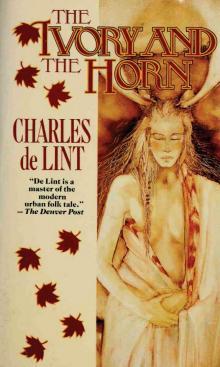 The Ivory and the Horn
The Ivory and the Horn Yarrow
Yarrow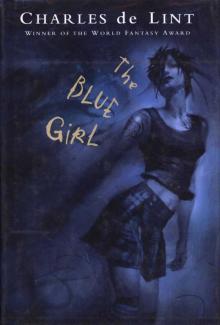 The Blue Girl
The Blue Girl Spirits in the Wires
Spirits in the Wires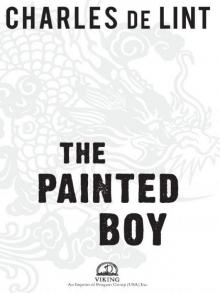 The Painted Boy
The Painted Boy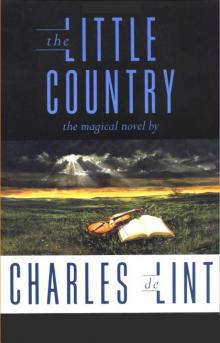 The Little Country
The Little Country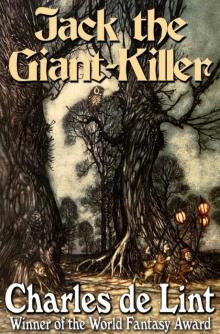 Jack of Kinrowan: Jack the Giant-Killer / Drink Down the Moon
Jack of Kinrowan: Jack the Giant-Killer / Drink Down the Moon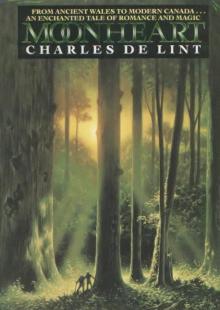 Moonheart
Moonheart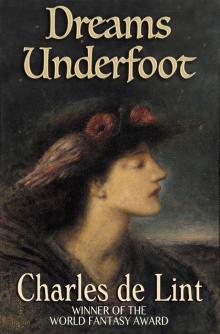 Dreams Underfoot
Dreams Underfoot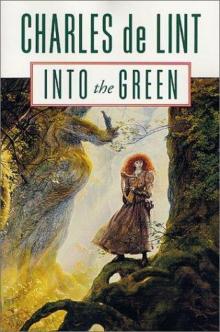 Into the Green
Into the Green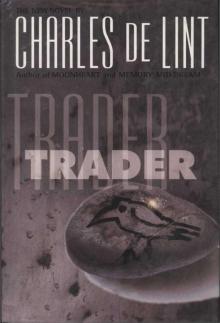 Trader
Trader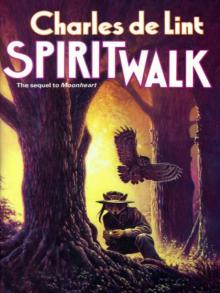 Spiritwalk
Spiritwalk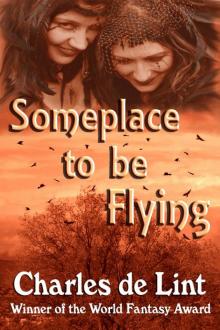 Someplace to Be Flying
Someplace to Be Flying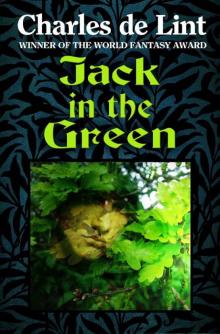 Jack in the Green
Jack in the Green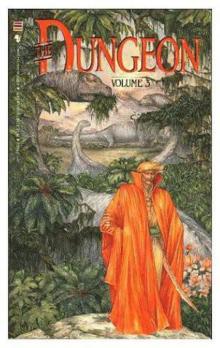 The Valley of Thunder
The Valley of Thunder Out of This World
Out of This World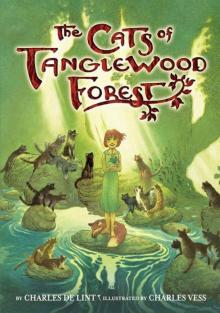 The Cats of Tanglewood Forest
The Cats of Tanglewood Forest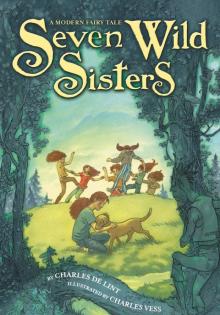 Seven Wild Sisters
Seven Wild Sisters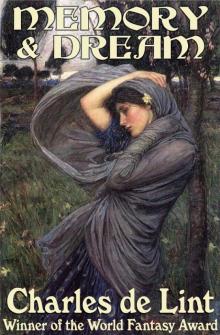 Memory and Dream
Memory and Dream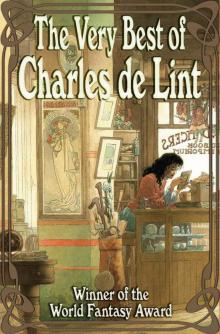 The Very Best of Charles De Lint
The Very Best of Charles De Lint Under My Skin
Under My Skin Forests of the Heart
Forests of the Heart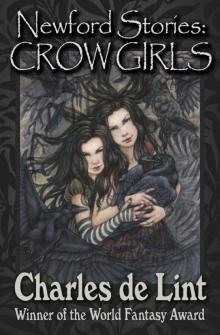 The Newford Stories
The Newford Stories Moonlight and Vines
Moonlight and Vines Angel of Darkness
Angel of Darkness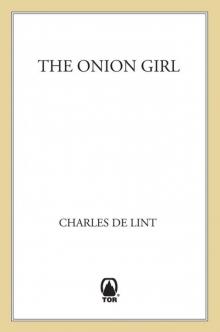 The Onion Girl
The Onion Girl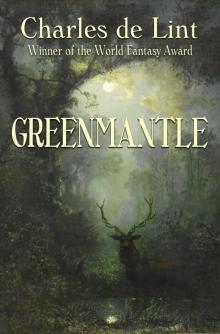 Greenmantle
Greenmantle Waifs And Strays
Waifs And Strays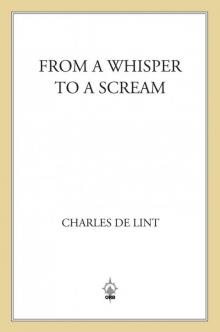 From a Whisper to a Scream
From a Whisper to a Scream Over My Head
Over My Head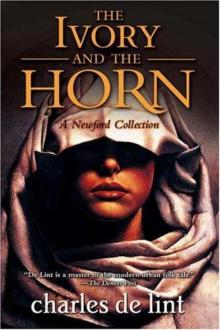 The Ivory and the Horn n-6
The Ivory and the Horn n-6 Our Lady of the Harbour
Our Lady of the Harbour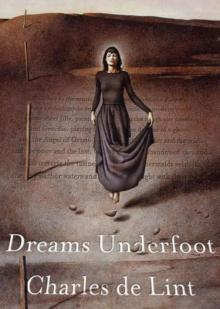 Dreams Underfoot n-1
Dreams Underfoot n-1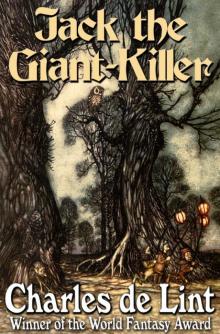 Jack the Giant-Killer (Jack of Kinrowan Book 1)
Jack the Giant-Killer (Jack of Kinrowan Book 1)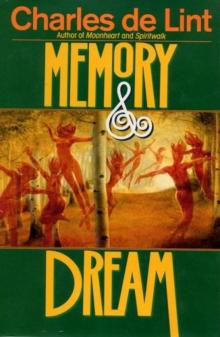 Memory and Dream n-5
Memory and Dream n-5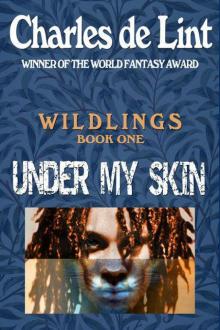 Under My Skin (Wildlings)
Under My Skin (Wildlings)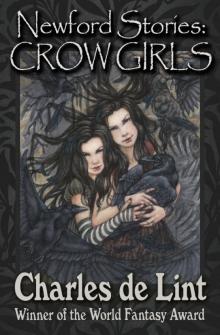 Newford Stories
Newford Stories The Wind in His Heart
The Wind in His Heart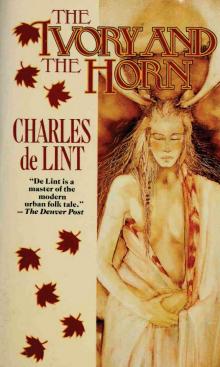 Ivory and the Horn
Ivory and the Horn